- Home
- Peter F. Hamilton
Light Chaser
Light Chaser Read online
Begin Reading
Table of Contents
About the Authors
Copyright Page
The author and publisher have provided this e-book to you without Digital Rights Management software (DRM) applied so that you can enjoy reading it on your personal devices. This e-book is for your personal use only. You may not print or post this e-book, or make this e-book publicly available in any way. You may not copy, reproduce or upload this e-book, other than to read it on one of your personal devices.
Copyright infringement is against the law. If you believe the copy of this e-book you are reading infringes on the author's copyright, please notify the publisher at: http://us.macmillanusa.com/piracy.
To our families, decent people who through no fault of their own have to live in the same house as writers
Take this kiss upon the brow!
And, in parting from you now,
Thus much let me avow—
You are not wrong, who deem
That my days have been a dream
Edgar Allen Poe, “A Dream Within A Dream” (1849)
I
AMAHLE COULD NO LONGER remember how old she was. Born human and later imbued with synthetic eight-letter DNA, she was always destined to have a lifespan measured in millennia. Then she found herself flying the Mnemosyne around and around a loop of The Domain’s settled worlds at close to the speed of light, so time compression made her effectively immortal to any observer. But the night before she died, she said: “I think I’m finally scared.”
“Don’t worry,” Carloman said. “It will be so quick, not even your nerves can send a pain signal into your brain.”
She clung to him in the webbing envelope as the minibots slowly broke up the last extraneous parts of the cabin around them, shrinking it further. “That wasn’t quite what I meant. It’s not the pain, it’s death itself.”
“There is nothing to fear. Trust me, I remember all my deaths.”
“I’ll try,” she said, and gripped him tighter, pressing her face into his skin as if extra comfort might be found there. “Really I will.”
She had adored her shipboard life ever since it began, whenever it began back in those time-lost circumstances. Mnemosyne was the sleek end product of a society at the height of its technological prowess, a starship that travelled at point-nine-seven lightspeed between the inhabited worlds of The Domain. Its two-kilometre length resembled a thick silver spear as it slipped through interstellar space, a design flourish only the indolence of a true post-scarcity world would bother with. In space, alone and unseen in a bubble of relativity distorted time, there was really no need for aesthetics. Yet its designers had given it a cloak of fluxfabrik like viscid quicksilver that flowed protectively over the long gantry spine of struts which held its component modules together: life support, big enough to carry a hundred passengers in considerable luxury; engineering with its half-million integrated systems maintained by semi-sentient bots and a cluster of manufactories; a hangar where its subsidiary craft rested between star systems; tanks, plenty of those, containing both fuel and matter reserves for the manufactories; and generator stacks providing the phenomenal quantity of energy required by the final module, the negative-matter drive. All of this perfect machinery was controlled by a full-sentient-rated AI, guiding it unerringly across interstellar space on voyages that lasted for years of ship-time and decades of real-time.
Amahle, who’d been its captain and sole occupant for thousands of years as she flew around and around the loop, had relished the wonders and miseries which human civilizations were capable of. It was a perfect life for someone of her origin. Experiencing the lives of others from the safety and solitude of the gulf between stars.
Was.
Had been.
Used to be.
* * *
Now the Mnemosyne was a very different beast as it approached the subgiant star three thousand light years from the outermost worlds of The Domain. No longer slim and streamlined, the silver fluxfabrik cloak had morphed out into a broad umbrella with the transformed starship nestled in its shade, where it was protected from near-lightspeed particle impact. For the last two years of the fifteen-year voyage, a swarm of engineering bots had been industriously restructuring the ancient starship. The hangar with all its surface-to-orbit shuttles and trans-planetary craft had gone, converted into raw mass along with every other superfluous component, to be stored as plasma in big magnetic confinement chambers. That included the palatial life support module, which had slowly been fed into the matter refineries over the final six months of approach. No longer did Amahle have vast compartments of every environment from tropical to polar; the swimming aquarium was long gone, as were the med-clinic and faux eighteenth-century-Earth aristocrat’s dining hall. Life support had shrunk down to a ten-metre sphere, with very basic utilities. Over the last month, the matter refineries had even devoured their own engineering section in a final act of cybernetic cannibalism. All these alterations had reduced the Mnemosyne to an errant clutter of globes ribbed with big flow ducts, transparent pipes that replaced the original gantry in a woven helix of glowing plasma, as if the starship were somehow surrounded by machine DNA.
* * *
Amahle woke on the last morning and smiled at Carloman, who was still in the webbing envelope next to her. He smiled back at her.
“Are you sure about this?” he asked.
“I think that’s what I should be asking you, isn’t it? And anyway, whoever asks, they should have done it fifteen years ago, before we started.”
“Touché.”
They both wriggled out of the webbing. Amahle found the stk bag with her dress in. Peeled it off the wall and opened it. There were no other clothes left, wardrobes the size of houses had all been transformed into plasma.
“Nice,” Carloman observed as she put it on. “You look gorgeous, but then you always do, every time.” There was moisture in his eyes as he spoke.
She’d picked the garment up centuries before from a world on the loop that was forever poised on the cusp between totalitarian barbarism and the steam age. It was beautiful, lush red silk that moved like oil, hand-tailored to her unchanging figure, elegant and sophisticated, as well as subtly enticing. “The perfect definition of overdressing for the occasion,” she told him. “But I wanted to go out in style.”
“Mission accomplished.”
“When you say things like that, so full of meaning, I never know if you’re quoting some famous deep-history person or not.”
“Quoting, but very out of context.”
They kissed.
“Let’s get on with it,” she said levelly. Even so, she was shaking slightly as they strapped themselves into the acceleration couches on the wall opposite the bathroom chamber.
“Three-sixty visual,” she told the Mnemosyne’s network. It wasn’t a sentient AI anymore, not since she’d killed the high-level routines decades before. But it operated the diminished starship’s functions effectively, obediently following her commands.
The little cabin’s walls vanished, replaced by the external sensor feeds. Two acceleration couches sped through space at point-nine-four lightspeed. Behind them was a small patch of red mist, all the stars they were racing away from, including the vast area of space containing The Domain. Ahead was a single point of painfully intense blue light: the subgiant. Between the two, bracketing the couches, was a darkness even Amahle, with all her centuries of space travel experience, found unnerving.
“We’re about twenty hours out,” she said as navigational graphics slid over her vision. “It’s going to get bumpy now.”
He grinned. “Finally, something that’s physical.”
The Mnemosyne was coming in twenty degrees south of the subgian
t’s ecliptic, a vector which kept them clear of all the planets, asteroids, comets, and dust that orbited around the star’s equatorial band. But even so, the density of particles grew as they closed on the huge star. Their curving silver shield had been glowing a faint violet for over a year as it repelled interstellar gas and the occasional larger clump of carbon molecules that struck them. Now the glow started to increase as they streaked inwards, exerting a weak braking force against the starship’s terrific velocity. The negative-matter drive increased thrust to compensate.
Amahle pulled two of the subgiant’s planets up out of the visual and studied the associated datafield. “Some interesting chemical activity in those atmospheres,” she observed as the cloud-wrapped globes hung before them. “Very non-terrestrial. Which one is it, do you think?”
“I have no idea what form The Exalted might take. See, you’re being too conventional looking in the terrestrial life band. They could be evolving on one of the cryoplanets, or maybe floating through the star’s corona.”
“Not for much longer,” she said. As she’d done countless times every day of the mission, she checked the stasis vault. The datafield reassured her the strangelet particle they were carrying at the heart of the Mnemosyne remained stable.
At a hundred AUs out, the glow of atoms rupturing around the silver shield was expanding, stretching out behind them like a flickering cometary tail. Amahle had already felt the starship shudder several times as they smashed into solar debris massing several grams. The resultant detonations were like fusion bombs going off against the fluxfabrik. Their velocity punched them through, putting the blast tens of thousands of kilometres behind them in milliseconds. But the shield suffered, ablation carnage ripping away huge segments of its quasi-solid structure. The thick flow ducts twined around the ship responded instantly, shunting plasma up to reinforce the depleted fluxfabrik shield at near-lightspeed, their radiance rivalling the impact plumes for brightness.
“I’m surprised we’re still here,” Amahle said. “Surely, The Exalted will just change this reality?”
“Reality is what we perceive it to be.”
“You mean we’re willing this to happen?”
“Not exactly, the physical universe we perceive has an inertia all of its own, the rules, if you like. Time seems to be a constant within it; even we are governed by that while we’re here. Think of this flight as playing chess with causality. And this, the end, is our checkmate move.”
“No matter what, I’m glad I found you again,” she told him sincerely.
“We always find each other.”
“You’re a romantic.”
“Yes.”
“No, really, a romantic. You believe love is a universal constant, too.” She looked across at him. Seeing him in profile against the tortured breath of the shield’s impact flare, his eyes closed, lips lifted serenely.
“Of course, how else do you explain us?” he said.
* * *
At forty AUs out, the buffeting had increased dramatically. It took considerable effort for Amahle not to grip the edge of the acceleration couch in an attempt to hold still. Maybe wearing the dress had been a bad idea.
“We’re past the outer cryoplanet,” Carloman said. “Five hours to go.”
“I wonder if they’ll go fast or slow.”
“Perception is your—”
“Yes! I get it.”
“Think of it as a whole lifetime.”
“Ha! Even mayflies have longer than this.”
“When did you last see a mayfly?”
“I’m not sure I ever have.” She gave him a brittle grin. “Maybe I remembered it from before. Some things are sharper than they have been for years.”
“That’s good. That means death is approaching.”
“You really know how to cheer a girl up.”
* * *
The Mnemosyne’s damage tail grew brighter and longer as they drew closer to the subgiant, the rip of atomic ruin taking longer to decay, it was so violent. A rigid strand of actinic light stretched out for almost half an AU behind the starship now, its tip a glare point to rival the star it was approaching. In the life support cabin, the noise of the solar wind impacting against the fluxfabrik shield had become so loud, talking was almost impossible. The severe shaking made the display judder to a chaotic blur, reducing the datafield to chaos. But there was no mistaking the steadily brightening subgiant directly ahead, expanding out from a speck to a small intense disk.
“Five minutes,” Amahle shouted. She wriggled an arm free of the restraint straps, reaching out—
Something large, probably a rock chunk massing a kilogram, struck the fluxfabrik shield. The vicious detonation shock wave transmitted through what was left of the starship pummelled the life support cabin. Amahle screamed as her arm was wrenched round painfully. Carloman caught her hand, and they gripped each other tightly. Outside, the plasma ducts surged, brightening to primordial levels as they fed reinforcements to the shield.
Amahle grimaced at the forward image. The subgiant was inflating rapidly now, a circular expanse of light that was a quarter of her vision. A half. Rushing towards them—
“This is a seriously bad idea,” she yelled. Tried to laugh, but all she could do was cry.
Carloman squeezed her hand tighter. “I’m here. I’m never going to let go of you—”
They were facing each other when the Mnemosyne reached the outer fringes of the corona. The density of the solar ejecta overwhelmed the fluxfabrik shield in milliseconds. Mnemosyne didn’t explode, there simply wasn’t time, it instantaneously transformed to vapour. A plume that was still travelling relativistically as it swept past the roiling prominences as they rode rogue magnetic flux lines. It pierced the chromosphere like a phantom arrow, stabbing further down into the photosphere. That was where it finally lost cohesion as it briefly created a splash crater a thousand kilometres wide through the elemental soup.
The stasis vault disintegrated along with the rest of the starship, liberating the strangelet. But not even the vast outpouring of plasma and light of a star could repel the cataract of atomic wreckage travelling a mere fraction under lightspeed. The unnatural cluster of quarks punctured the convection zone.
As it shot deeper and deeper into the subgiant, the strangelet finally struck an atomic nucleus, catalysing its transformation into strange matter. The energy release generated a larger, more stable strangelet. It hit another nucleus, another conversion, another infinitesimal growth in size occurred.
The subgiant had a diameter of just over three million kilometres. To convert the entire mass of a star that large took time. But the strangelet’s alchemy was exponential. For the first century, there was no noticeable effect. Then the surface began to distort, sunspots bloomed and multiplied as the magnetic flux lines were warped out of alignment. The internal anomaly began to devour the rest of the ordinary matter at a rate which quickly outstripped the fusion process. Towards the end, energy creation rose at a phenomenal rate, creating an exceptionally fierce emission of ultra-hard radiation. Future alien astronomers across the galaxy would see the final explosion as a supernova of unusual potency and wonder at its cause.
The effect of the detonation on the subgiant’s planets was as devastating as Carloman had hoped. Its initial pulse of radiation hit the two gas giants, flash-evaporating their upper atmospheres to send continent-sized plumes writhing out into space. The lower atmosphere immediately started to decompress to replace the loss, which in turn liberated the ultra-volatile liquid layers beneath in a progression that ended in both cores rupturing, adding their force to the cataclysm. Cryoplanets burned, the small solid worlds shattered.
As the haze of the supernova’s detonation wavefront darkened and dissipated across interstellar space, the full scale of the destruction was revealed. There was no planetary system anymore, only a zone of total annihilation with a small, radio-silent husk at the centre. The quark star: with its outer shell of neutronium containing differe
ntiated layers of quark material, which in turn formed a prison around the core of strange matter. A prison which would shield its secret composition until the heat death of the universe.
II
THE SIGHT OF THE cat stopped Amahle in her tracks. It lay curled on the wooden countertop of one of the hastily erected market stalls, between the buckets of apples and blackberries the merchant had brought in this morning on his cart. Sleek and black with white paws, the animal seemed oblivious to the commercial tumult around it—the livestock; the laughter of children splashing through the mud; the chatter of men and women browsing and haggling over the various wares on display; and the ever-present sound of rain dripping from the canvas awning.
She could barely remember the last time she’d seen a cat with her own eyes. It must have been a couple of circuits before—so, at least two thousand years—and several dozen light years closer to the Central Worlds. She hadn’t even known there were any here on Winterspite. But then, given their medieval technology, she supposed they needed something reliable to guard the fruit and grain stores from rats and other vermin. Rats had travelled between the stars to every world in The Domain; even the post-scarcity worlds had them.
“What’s its name?” she asked in the local tongue, reaching out to tickle the animal behind its ear. The stallholder blinked at her with rheumy eyes.
“I just call him ‘cat.’”
“Is he yours?”
“I reckon so. Much as a cat belongs to anyone.”
“Is he for sale?”
The man scratched his beard. “I don’t know. Nobody’s ever asked to buy him before.”
Amahle reached inside her cloak and brought out a couple of coins. “I’ll give you two gold florins for him.”
To his credit, the stallholder kept a straight face; the man would have made an intimidatingly good poker player. Two florins represented more wealth than he would likely see in an entire season. “Lady,” he said, “you’ve got a deal.” He fetched a wicker basket from his cart, placed the cat inside, and fastened the lid.

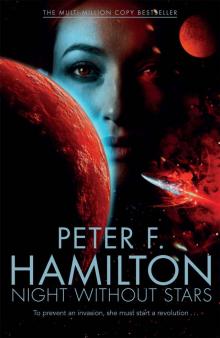 A Night Without Stars
A Night Without Stars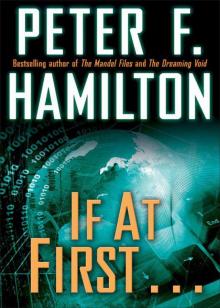 If at First . . .
If at First . . .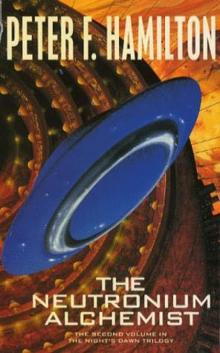 The Neutronium Alchemist
The Neutronium Alchemist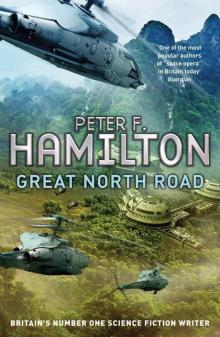 Great North Road
Great North Road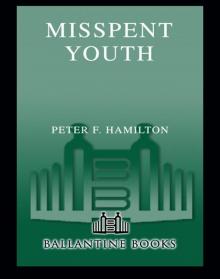 Misspent Youth
Misspent Youth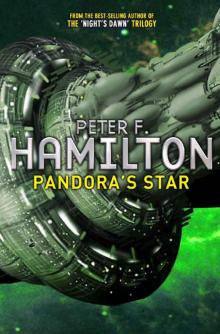 Pandora's Star
Pandora's Star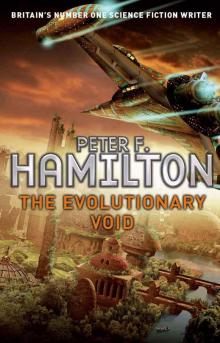 The Evolutionary Void
The Evolutionary Void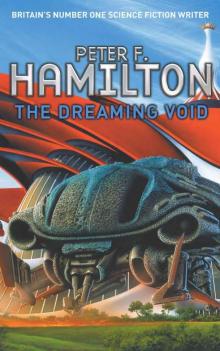 The Dreaming Void
The Dreaming Void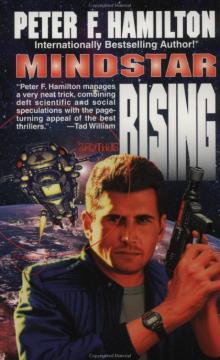 Mindstar Rising
Mindstar Rising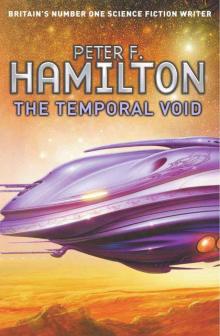 The Temporal Void
The Temporal Void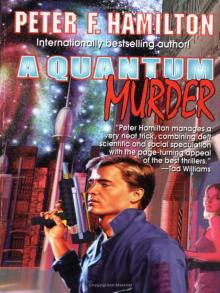 A Quantum Murder
A Quantum Murder The Hunting of the Princes
The Hunting of the Princes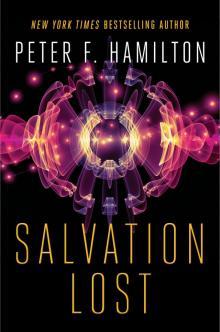 Salvation Lost
Salvation Lost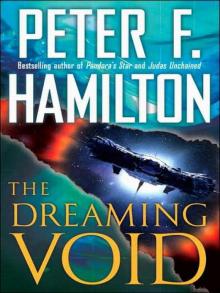 The Dreaming
The Dreaming Salvation
Salvation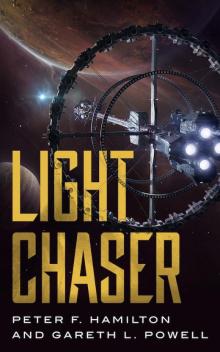 Light Chaser
Light Chaser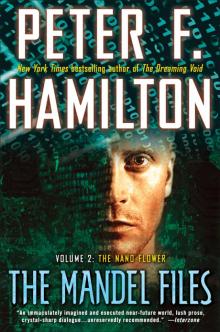 The Mandel Files, Volume 2: The Nano Flower
The Mandel Files, Volume 2: The Nano Flower![The Saints of Salvation [British Ed.] Read online](http://i1.bookreadfree.com/22/the_saints_of_salvation_british_ed__preview.jpg) The Saints of Salvation [British Ed.]
The Saints of Salvation [British Ed.]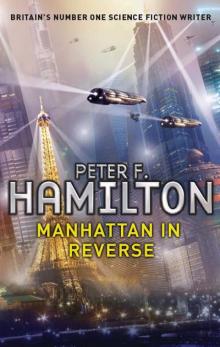 Manhattan in Reverse
Manhattan in Reverse The Secret Throne
The Secret Throne A Window Into Time
A Window Into Time A Second Chance at Eden
A Second Chance at Eden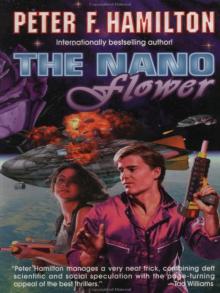 The Nano Flower
The Nano Flower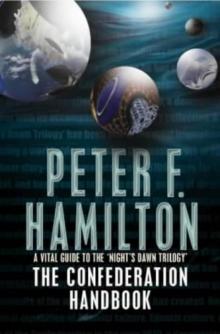 The Confederation Handbook
The Confederation Handbook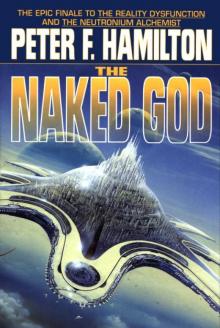 The Naked God
The Naked God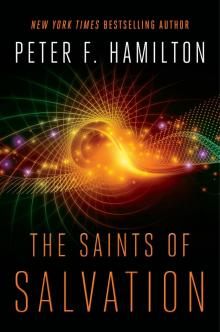 The Saints of Salvation
The Saints of Salvation The Void Trilogy 3-Book Bundle
The Void Trilogy 3-Book Bundle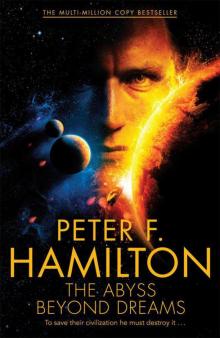 The Abyss Beyond Dreams
The Abyss Beyond Dreams A Voyage Through Air
A Voyage Through Air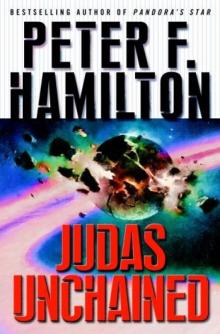 Judas Unchained
Judas Unchained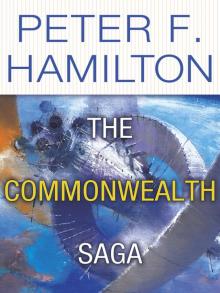 The Commonwealth Saga 2-Book Bundle
The Commonwealth Saga 2-Book Bundle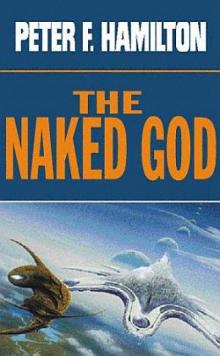 The Naked God - Flight nd-5
The Naked God - Flight nd-5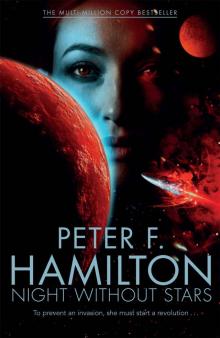 Night Without Stars (Chronicle of the Fallers Book 2)
Night Without Stars (Chronicle of the Fallers Book 2)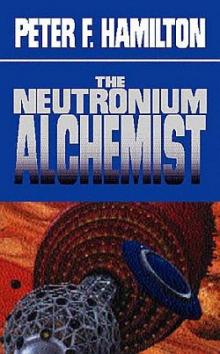 Neutronium Alchemist - Conflict nd-4
Neutronium Alchemist - Conflict nd-4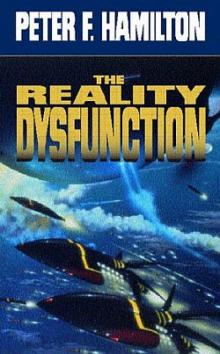 Reality Dysfunction - Expansion nd-2
Reality Dysfunction - Expansion nd-2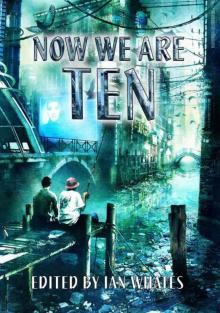 Now We Are Ten: Celebrating the First Ten Years of NewCon Press
Now We Are Ten: Celebrating the First Ten Years of NewCon Press Neutronium Alchemist - Consolidation nd-3
Neutronium Alchemist - Consolidation nd-3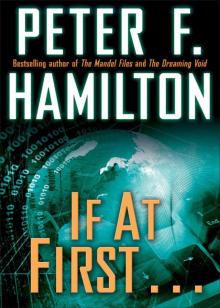 If at First . . . (Short Story)
If at First . . . (Short Story)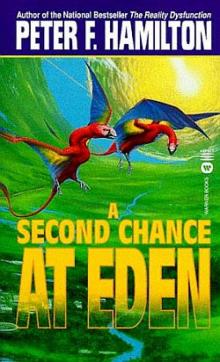 A Second Chance at Eden nd-7
A Second Chance at Eden nd-7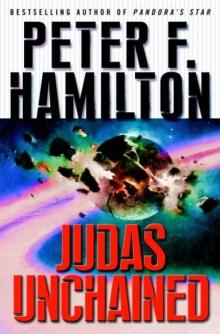 Judas Unchained cs-2
Judas Unchained cs-2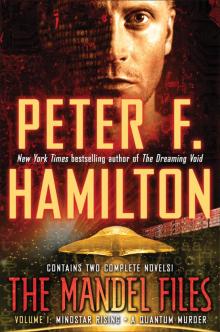 The Mandel Files, Volume 1
The Mandel Files, Volume 1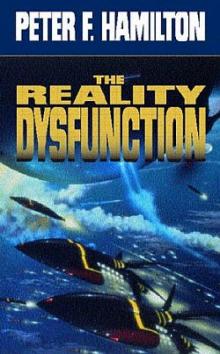 Reality Dysfunction — Emergence nd-1
Reality Dysfunction — Emergence nd-1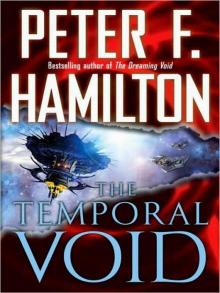 The Temporal Void (ARC)
The Temporal Void (ARC) The Mandel Files
The Mandel Files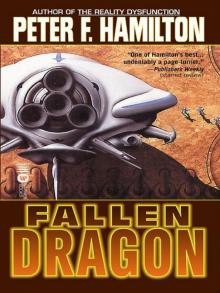 Fallen Fragon
Fallen Fragon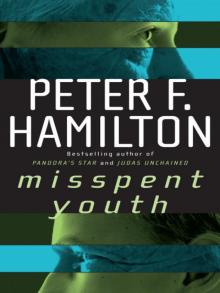 Misspent Youth (commonwealth saga)
Misspent Youth (commonwealth saga)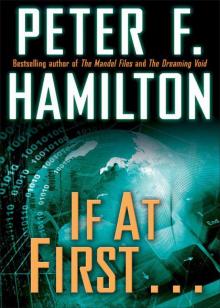 If at First...
If at First...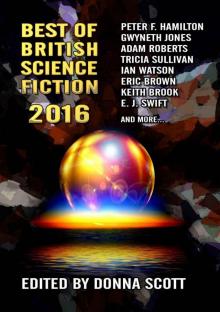 Best of British Science Fiction 2016
Best of British Science Fiction 2016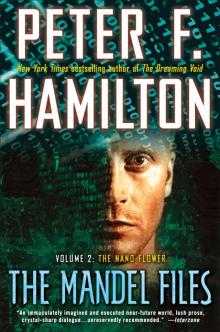 The Mandel Files, Volume 2
The Mandel Files, Volume 2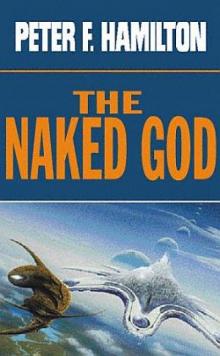 The Naked God - Faith nd-6
The Naked God - Faith nd-6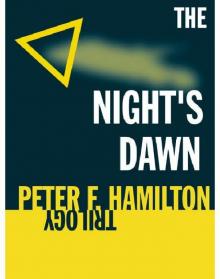 The Night's Dawn Trilogy
The Night's Dawn Trilogy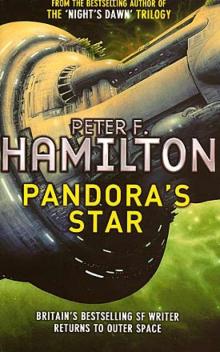 Pandora's Star cs-2
Pandora's Star cs-2 A Window into Time (Novella)
A Window into Time (Novella)